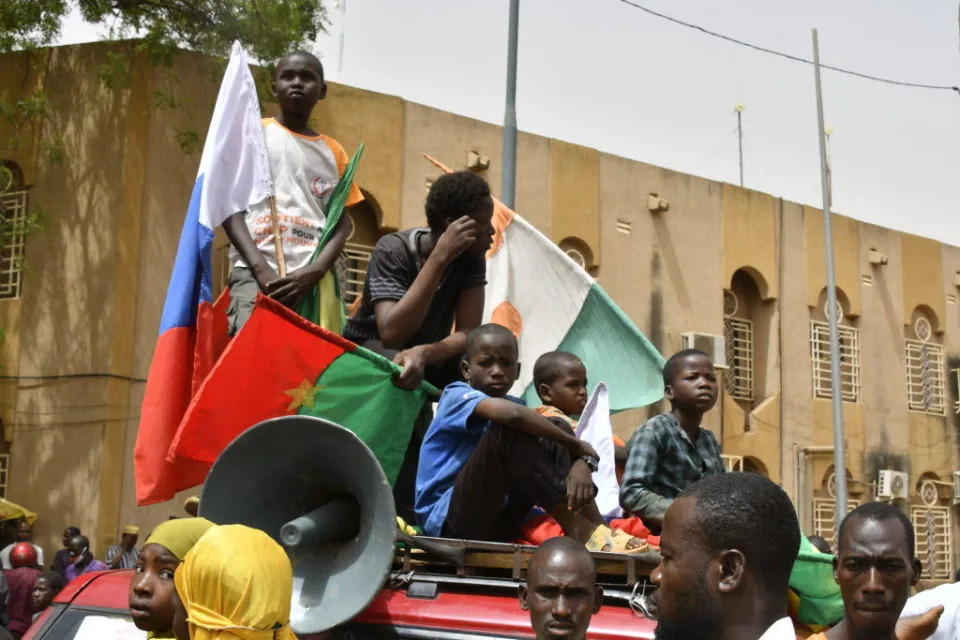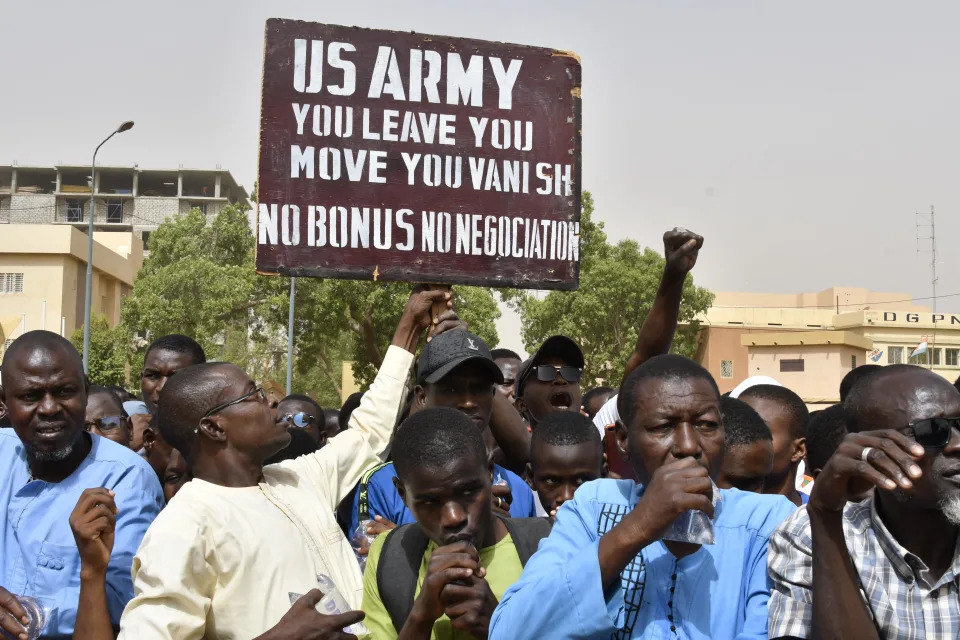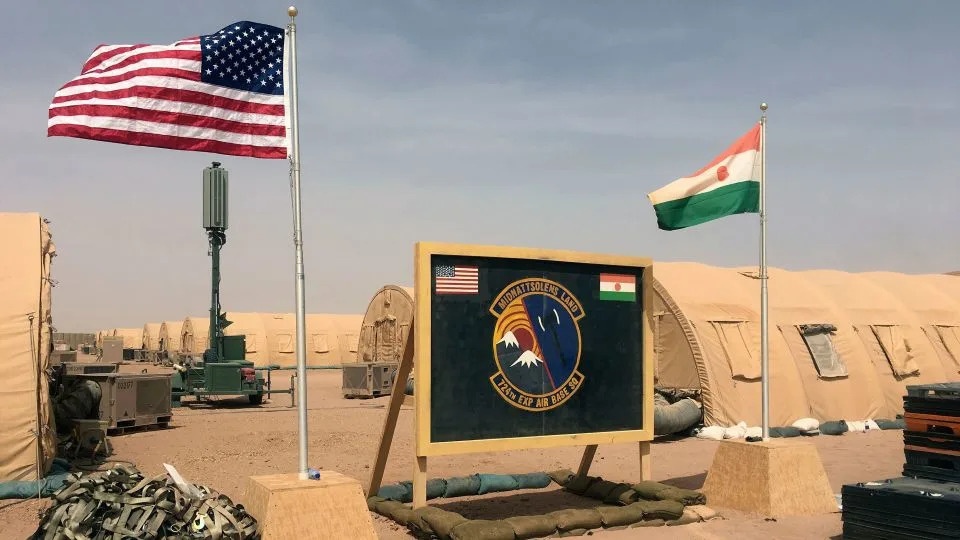Why the U.S. military's withdrawal from Niger is a "devastating blow"

After investing more than $1 billion in Niger over a decade, the U.S. military has agreed to withdraw its more than 1,000 forces from the West African nation over the next few months. It was not a move the U.S. had hoped to make, and officials tell CBS News it will be a severe blow to U.S. counterterrorism efforts in a region known to represent a number of major and growing threats.
Niger is a landlocked country surrounded by some unstable neighbors where local militias have joined forces with international terror organizations including al Qaeda and ISIS.
One senior U.S. military official who's spent time in Niger told CBS News the looming withdrawal was "a devastating blow, both for our regional counterterrorism efforts and to overall peace in the region going forward."
"Our soldiers have worked for years building the capacity and providing training to regional forces," the official said. "This is a tough blow on all levels."

Following a military coup in July 2023, Niger's leaders made it clear in various discussions with U.S. officials that they were not interested in U.S. efforts to help guide the country on a path toward new democratic elections, and were instead turning to Russia for security services and to Iran for a possible deal on Niger's uranium reserves.
In March, the head of the U.S. military's Africa Command, Gen. Michael Langley, warned members of the U.S. Congress that "a number of countries are at the tipping point of being captured by the Russian Federation."
Just days before Langley testified on Capitol Hill, he traveled to Niger to meet with the country's junta leaders. The meeting didn't go as U.S. officials had hoped, and soon after Langley and his entourage departed, Niger military spokesman Amadou Abdramane announced on national television that the country's joint military agreement with the U.S. was "suspended with immediate effect."

U.S. military sources told CBS News there was a diplomatic push to try to mend the frayed relationship, but that Nigerien officials had made it clear the security cooperation was untenable.
Niger's military government had already expelled French forces from the country in the wake of last year's coup and begun looking for new partners. U.S. officials said it was worrying when the Nigeriens expelled the troops from France, the former colonial power in the country.
Months later, in January, Niger's junta leaders agreed to enhance their military cooperation with Russia and, just last week, a Russian transport plane arrived in the capital Niamey reportedly carrying 100 Russian military trainers and a new air defense system.
The region around Niger has experienced six successful coups over the last three years alone. Guinea, Mali and Burkina Faso's ruling juntas have all issued statements of support for Niger's new military leaders.
Burkina Faso and Mali were the first to turn to the Russian mercenary firm previously known as the Wagner Group for military training and support.
Sources tell CBS News that a handful of Niger's coup leaders had previously received U.S. military training during various exercises on the continent.
It's believed the U.S. has spent more than $1 billion building two drone bases and a new embassy in Niger over about a decade. The Niger bases and the roughly 1,100 U.S. forces based at them have been central to U.S. operations in the volatile Sahel region, which stretches right across northern Africa.
Many Americans first became aware of U.S. special forces operations in Niger in 2017, after four U.S. soldiers were killed in an ambush by ISIS militants just outside the town of Tongo Tongo.
Last week, a serving member of the U.S. forces in Niger sent an email to Speaker of the House of Representatives Mike Johnson detailing the conditions for himself and his fellow troops in the African nation, saying that since the coup, they had been told to "sit and hold," which was preventing them from carrying out their mission.
In the letter, a copy of which was shared online by Rep. Matt Gaetz, the soldier said America's troops in Niger were effectively being "held hostage" in a country that had made it abundantly clear they were no longer welcome.
At regular weekend protests in Niamey, Nigeriens have demanded that U.S. soldiers leave immediately, with one poster reading: "US Army, You leave, you Vanish."
Another U.S. delegation is expected to visit Niger soon to discuss a timeline for the withdrawal, which is likely to take place over the coming few months.
Pentagon Vows to Press On with Counterterror Mission as Negotiations to Depart Niger Begin
The Pentagon said Monday that it is not abandoning the counterterrorism mission in West Africa even as it begins negotiations to withdraw the U.S. military presence in Niger and questions are arising over military operations in neighboring Chad.
The potential military withdrawal from Niger comes more than a month after the military junta ruling the country made the demand, after it came to power in July through a coup. A U.S. official told The Associated Press on Saturday that there is no timeline for the withdrawal from Niger, which hosts American bases and has played a key role in the U.S. effort to combat a proliferation of terrorist groups in Africa.
"There is a significant counterterrorism consideration here throughout Western Africa and something that we continue to work very hard on," Pentagon spokesman Maj. Gen. Pat Ryder told reporters Monday. "We'll also continue to explore options and how we can ensure that we're able to continue to address potential terrorist threats."
Discussions have begun between an American delegation and Niger about an "orderly withdrawal of U.S. forces from the country," according to Ryder.
The U.S. military has two bases in the country that have been used in counterterrorism operations against organizations such as the Islamic extremist group Boko Haram, the Islamic State in the Greater Sahara, and al-Qaida affiliate Jama'at Nusrat al-Islam wal-Muslimin, or JNIM.
Between January and June 2023, the region experienced more than 1,800 terrorist attacks that killed more than 4,500 people, according to a press release from the United Nations.
In 2017, 12 U.S. Army Special Forces soldiers were accompanying 30 Nigerien troops on a mission to capture or kill a high-level Islamic State group leader when they were ambushed by more than 100 extremists just outside the village of Tongo Tongo, leaving four American soldiers dead and two more wounded.
In July 2023, a military junta in Niger ousted democratically elected President Mohamed Bazoum from power. Since then, the Pentagon has evacuated some personnel from the country and consolidated the majority of its military footprint at one of its two bases.
At the moment, there are around 1,100 U.S. personnel in the country.
Ryder would not say what would happen to the two bases should U.S. forces withdraw completely.
After the coup, international news outlets have reported that Niger's rulers have begun to pursue closer ties with Russia. Nearby Mali and Burkina Faso -- countries also run by military juntas -- already have Russian troops in place.
The news of the withdrawal negotiations comes just days after outlets such as Reuters reported that at least one military official in neighboring Chad has also issued a demand that the U.S. military halt its activities in the country.
Ryder stressed Monday that "to my knowledge, U.S. forces have not been asked to leave Chad" but noted that there have been discussions with the country about the legal agreement that governs the U.S. presence there.
However, unlike Niger, where the American military maintained a significant presence that included airfields from which drone missions were launched, a defense official told Military.com that there are only around 100 U.S. troops -- mostly officers who manage military coordination efforts, not operations -- in Chad, and that total also includes embassy staff.
"We're going to continue to take ... the terrorist threat seriously and we're going to continue to work with partners throughout Africa on that front," Ryder said. The Pentagon wants "to work with reliable partners to address the threat that affects countries and citizens all throughout the region."
US troops set to withdraw from Niger, State Department official says
US Deputy Secretary of State Kurt Campbell met with Niger’s Prime Minister Ali Lamine Zeine on Friday and they agreed – after Niger’s demands – that the US would militarily withdraw from the country, according to a State Department official.
In the coming days, there will be conversations over the timeline for the withdrawal with the Department of Defense, the official said.
The major drawdown will significantly impact the US troop presence on the continent of Africa, and the move comes amid serious US concerns about the country’s deepening relationships with Russia and Iran. The New York Times first reported on the expected withdrawal.
Campbell’s meeting with Zeine was their second this week, while he was in Washington, DC, for the World Bank’s spring meetings.
“We can confirm the beginning of discussions between the US and Niger for the orderly withdrawal of US forces from the country,” a defense official told CNN.
“The DoD is providing a small delegation from the Pentagon and U.S. Africa Command to participate in the discussions. In terms of departure timing, we do not want to speculate and get ahead of the planning discussions,” the official added.
Just last month, Niger said it was revoking its military cooperation deal with the US, and these conversations followed what have been contentious interactions between officials from the two countries in recent months. Last summer the US troops stationed in Niger became inactive after a military coup that pushed out the democratically elected president, Mohamed Bazoum, and installed the military junta.
Throughout the conversation with Campbell this week, Zeine stressed a desire for partnership with the US to continue and made an effort to differentiate this situation from that of the French, the State Department official said. Still, it appears that both countries will be militarily forced out of the country within a year of one another. The US will maintain a diplomatic presence in the country, the official said.
Earlier this week in Niger, a senior airman filed a formal whistleblower complaint, warning that the US ambassador to Niger and the defense attache had “intentionally suppressed intelligence” in an attempt to “maintain a façade of a great country-to-country relationship.”
And US forces on the continent faced another blow last week when Chadian officials threatened to cancel the Status of Forces Agreement, or SOFA, which determines the rules and conditions under which US military personnel can operate in the country. While the letter did not directly order the US military to leave Chad, officials told CNN that it said all US forces would have to leave a French base in N’Djamena.
- Questions and Answers
- Opinion
- Story/Motivational/Inspiring
- Technology
- Art
- Causes
- Crafts
- Dance
- Drinks
- Film/Movie
- Fitness
- Food
- Games
- Gardening
- Health
- Home
- Literature
- Music
- Networking
- Other
- Party
- Religion
- Shopping
- Sports
- Theater
- Wellness
- News
- Culture
- War machines and policy


